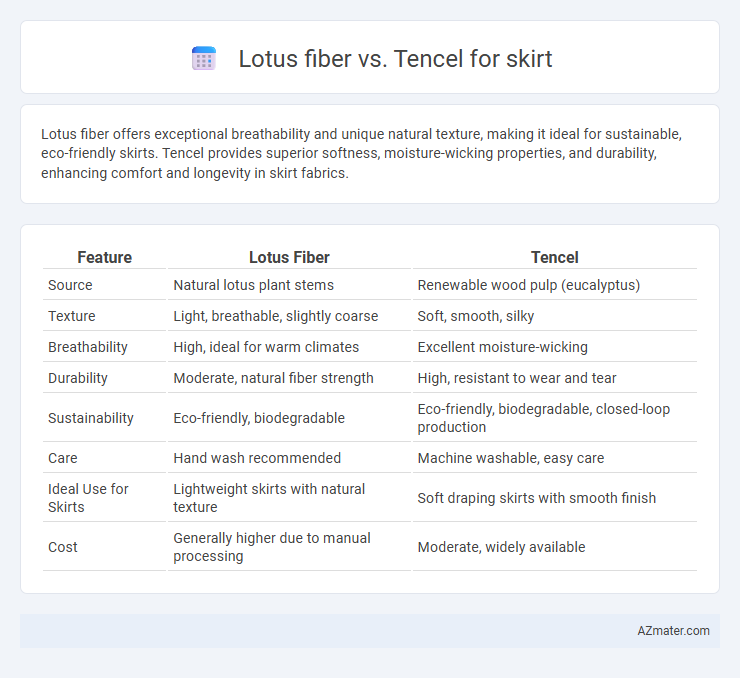Lotus fiber offers exceptional breathability and unique natural texture, making it ideal for sustainable, eco-friendly skirts. Tencel provides superior softness, moisture-wicking properties, and durability, enhancing comfort and longevity in skirt fabrics.
Table of Comparison
| Feature | Lotus Fiber | Tencel |
|---|---|---|
| Source | Natural lotus plant stems | Renewable wood pulp (eucalyptus) |
| Texture | Light, breathable, slightly coarse | Soft, smooth, silky |
| Breathability | High, ideal for warm climates | Excellent moisture-wicking |
| Durability | Moderate, natural fiber strength | High, resistant to wear and tear |
| Sustainability | Eco-friendly, biodegradable | Eco-friendly, biodegradable, closed-loop production |
| Care | Hand wash recommended | Machine washable, easy care |
| Ideal Use for Skirts | Lightweight skirts with natural texture | Soft draping skirts with smooth finish |
| Cost | Generally higher due to manual processing | Moderate, widely available |
Introduction: Lotus Fiber vs Tencel for Skirts
Lotus fiber, derived from lotus plant stems, offers eco-friendly, biodegradable fabric ideal for sustainable skirts, known for its natural breathability and unique texture. Tencel, produced from sustainably sourced wood pulp through a closed-loop process, provides a soft, durable, and moisture-wicking material, popular in modern eco-conscious fashion. Both fibers promote sustainability and comfort, but differ in texture and processing methods, influencing their suitability for various skirt styles.
Origin and Production Process
Lotus fiber, derived from the stems of the lotus plant primarily found in Southeast Asia, involves a labor-intensive harvesting process where fibers are carefully extracted, dried, and handwoven to create lightweight, breathable fabric. Tencel, produced from sustainably sourced eucalyptus wood pulp through a closed-loop lyocell process developed by Lenzing, emphasizes eco-friendly, efficient production with minimal environmental impact. The natural extraction of lotus fiber contrasts with the industrial, chemically managed Tencel manufacturing, influencing texture, sustainability, and price points in skirt fabrics.
Environmental Impact
Lotus fiber is highly sustainable, produced from lotus stems through a water-intensive but biodegradable process that yields minimal chemical waste, promoting eco-friendly fashion. Tencel, derived from sustainably harvested eucalyptus wood using a closed-loop process, significantly reduces water use and chemical emissions compared to traditional fibers. Both fibers offer eco-conscious alternatives for skirts, with Lotus fiber emphasizing natural biodegradability and Tencel optimizing resource-efficient production.
Texture and Comfort
Lotus fiber offers a unique texture characterized by its natural, coarse yet breathable feel that softens with wear, providing eco-conscious comfort ideal for skirts. Tencel, derived from sustainably sourced eucalyptus wood, delivers a silky-smooth texture with excellent moisture-wicking properties, enhancing overall comfort and breathability. Both fibers promote natural temperature regulation, with Tencel excelling in softness and Lotus fiber offering a distinctive tactile experience.
Breathability and Moisture Management
Lotus fiber offers exceptional breathability due to its natural hollow structure, allowing air to circulate and keep the skin cool in warm weather. Tencel, made from sustainably sourced wood pulp, excels in moisture management by rapidly absorbing and releasing sweat, maintaining dryness and comfort. For skirts, Lotus fiber is ideal for lightweight, breathable wear, while Tencel provides superior moisture control in active or humid conditions.
Durability and Longevity
Lotus fiber offers natural durability with a high resistance to wear and tear, making skirts crafted from it last longer under regular use. Tencel, derived from sustainably sourced eucalyptus, combines softness with strength, ensuring excellent fabric resilience and shape retention over time. Both fibers provide longevity, but Lotus fiber tends to have a slightly tougher texture that enhances durability, while Tencel excels in maintaining a smooth, wrinkle-resistant finish.
Color and Dye Affinity
Lotus fiber exhibits excellent natural color retention due to its inherent pale beige hue, requiring minimal dyeing and resulting in eco-friendly skirts with vibrant yet subtle tones. Tencel fibers possess superior dye affinity, absorbing colors uniformly and producing bright, saturated skirts with a smooth finish that resists fading. Choosing between Lotus fiber and Tencel for skirts depends on preference for natural, muted colors versus vivid, consistent dye results.
Care and Maintenance
Lotus fiber skirts require gentle hand washing with mild detergent and air drying to maintain their delicate texture and natural sheen, as machine washing can damage the fibers. Tencel skirts are more durable, allowing for machine wash on a gentle cycle with cold water and low heat tumble drying, which helps retain their softness and shape. Both fabrics benefit from avoiding bleach and direct sunlight during drying to preserve color integrity and fabric longevity.
Price and Accessibility
Lotus fiber skirts generally come with a higher price tag due to the labor-intensive extraction process and limited production, making them less accessible in mainstream markets. Tencel skirts offer a more affordable option as the fiber is produced through large-scale, sustainable manufacturing, resulting in widespread availability. Consumers seeking ethical fabrics at reasonable prices typically find Tencel more accessible, while Lotus fiber remains a niche luxury choice.
Which Fiber is Better for Skirts?
Lotus fiber offers exceptional breathability and moisture-wicking properties, making it ideal for skirts in hot climates, while Tencel, derived from sustainably sourced eucalyptus, excels in softness, durability, and wrinkle resistance, providing a smooth, eco-friendly finish. For skirts requiring a lightweight, breathable fabric with a natural matte texture, lotus fiber is preferable, whereas Tencel suits those wanting a luxurious, silky touch combined with easy maintenance. Choosing between lotus fiber and Tencel depends on prioritizing environmental sustainability and fabric performance tailored to skirt wearability and comfort.

Infographic: Lotus fiber vs Tencel for Skirt
 azmater.com
azmater.com